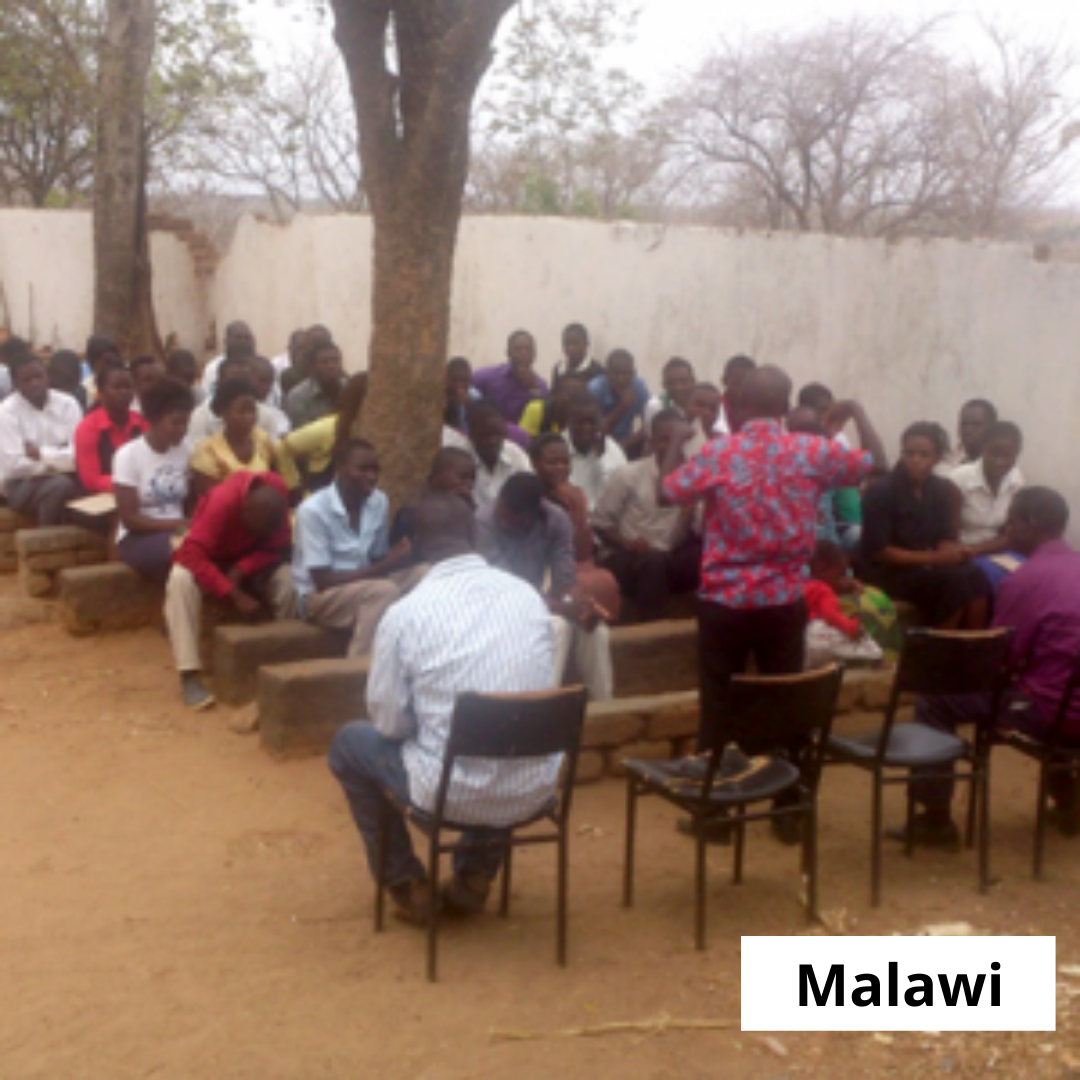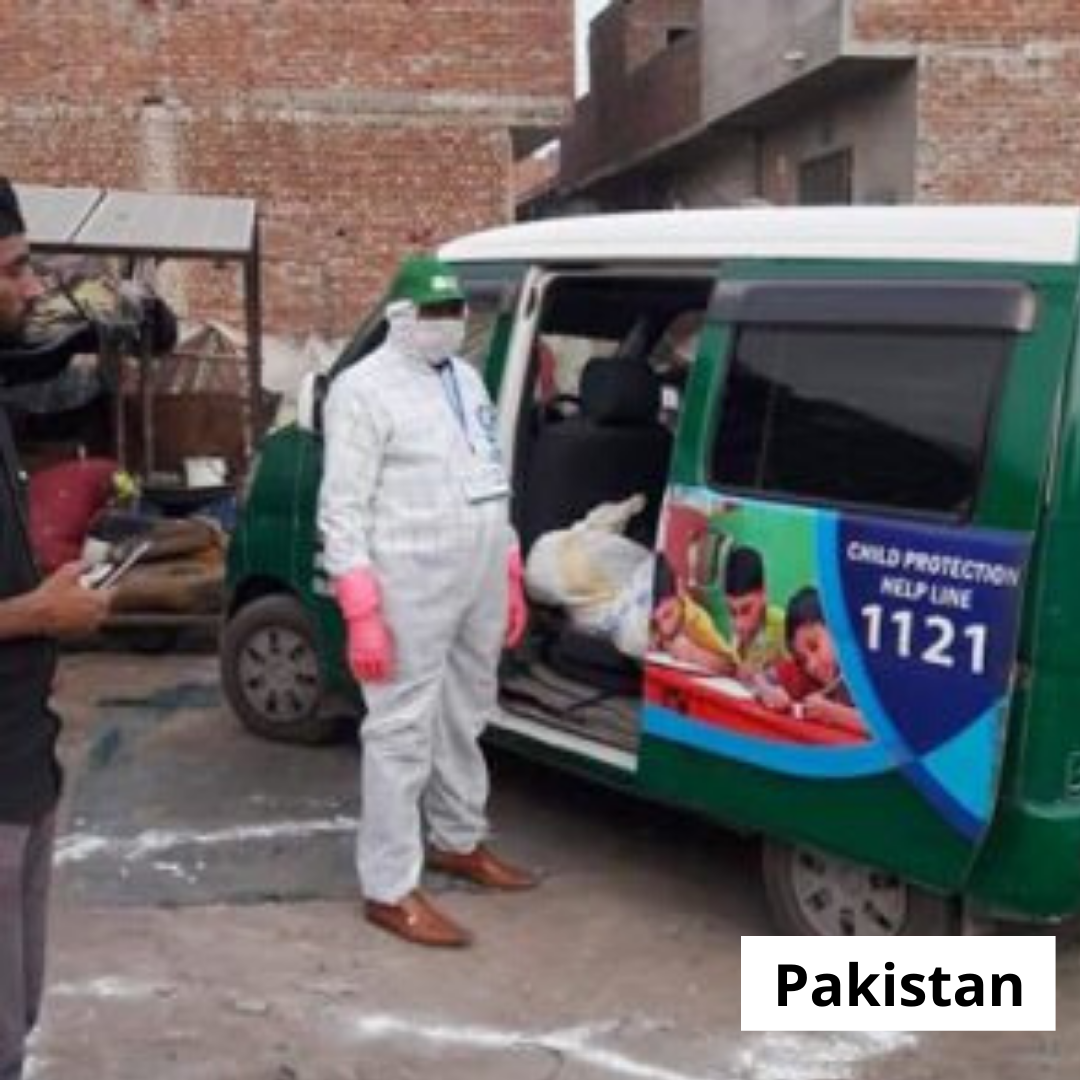![]() The COVID-19 pandemic has presented an extraordinary challenge for the people of all strata across the world. The poor, vulnerable and the most marginalised families and children risk being the biggest victims of this virus. As the numbers of cases seem to be increasing every day, so are the needs of millions of children and their families around the world.
The COVID-19 pandemic has presented an extraordinary challenge for the people of all strata across the world. The poor, vulnerable and the most marginalised families and children risk being the biggest victims of this virus. As the numbers of cases seem to be increasing every day, so are the needs of millions of children and their families around the world.
While physical distancing and lockdown measures are suppressing the transmission of the deadly virus, it is also resulting in a significant reduction of economic activity and collapse in the household income; severely affecting the poor and low-income families and their children. Lack of protective gears, sanitation facilities and food supplies are also pushing millions of people on the brink of hunger, illness and poverty.
The already exploited child labourers living in bondage, or living off meagre incomes are also one of the worst affected. With businesses shut, lives of 152 million child labourers across the globe have been left in a lull, with unclear signs of any improvement in their condition. Due to closure of schools and educational institutions, thousands of students have been impacted, especially children from vulnerable and disadvantaged communities.
Global March Against Child Labour network members across Asia, Africa and Latin America are therefore taking efforts to support vulnerable populations in their respective countries, providing them with essential supplies such as food, sanitary materials, masks, gloves and psychosocial support. Members are also making advocacy appeals to the government and stakeholders for protecting vulnerable children and their families.
See below how Global March members and network across the world is responding to COVID-19:
ARGENTINA
Confederación de Trabajadores de la Educación de la República Argentina” (CTERA), the national teachers’ union confederation, has developed a series of educational resources and materials accessible to students, teachers and families to support distance learning via the “Seguimos Educando” (Let’s Keep Teaching) platform. CTERA also worked on television and radio programming as well as printed booklets and materials to reach out to those without digital access. CTERA also participated in different meetings such as with Mercosur leaders, advocating for children’s rights, especially the right to education. Centro de Participación para la Paz y los Derechos Humanos (CePaDeHu) developed several campaigns in their response towards COVID-19 among which, one focused on the correct and protected use of social networking sites by youth. CePaDeHu developed resource materials for the use of teachers for addressing issues of child labour. CTERA and CePaDeHu work together, forming the Global March in Argentina. They are developing booklets with information on COVID19, the Right to Education, the Right to play and against Child Labour that will be distributed in Child Development Centres in Buenos Aires.
BANGLADESH
Bangladesh Shishu Adhikar Forum (BSAF) is concerned about the vulnerability of working children, street children and disadvantaged children because of the pandemic. Many families in the country are dependent on the income of working children, however due to the crisis; their protection and education have become uncertain. BSAF anticipates that within this month a large number of children will suffer due to lack of basic needs. Thus, organising Child Welfare Fund and advocacy for child rights and child protection have become more important than ever in Bangladesh. BSAF is, therefore, advocating for the same.
BRAZIL
Fórum Nacional de Prevenção e Erradicação do Trabalho Infanti (FNPETI) and Cada Crianza Project (100 million) collaboratively produced four guides with information on the human rights of children and youth and also on the impacts of the pandemic on the right to education and the expansion of inequality and school exclusion. FNPETI is also coordinating the production of videos by two young people on impacts of COVID-19 and child labour to be used for a virtual campaign on 12 June by Global March and ILO. They continue to raise awareness on the impacts and challenges of social isolation during Covid 19 using their social media network
COLOMBIA
Fundación Mundo Mejor is working on the development of a project: “Brújula Express” which is focused on the prevention of violence and advocating for a safe and healthy coexistence at home in times of COVID-19.In Colombia, April is also celebrated as childhood theme month.
COSTA RICA
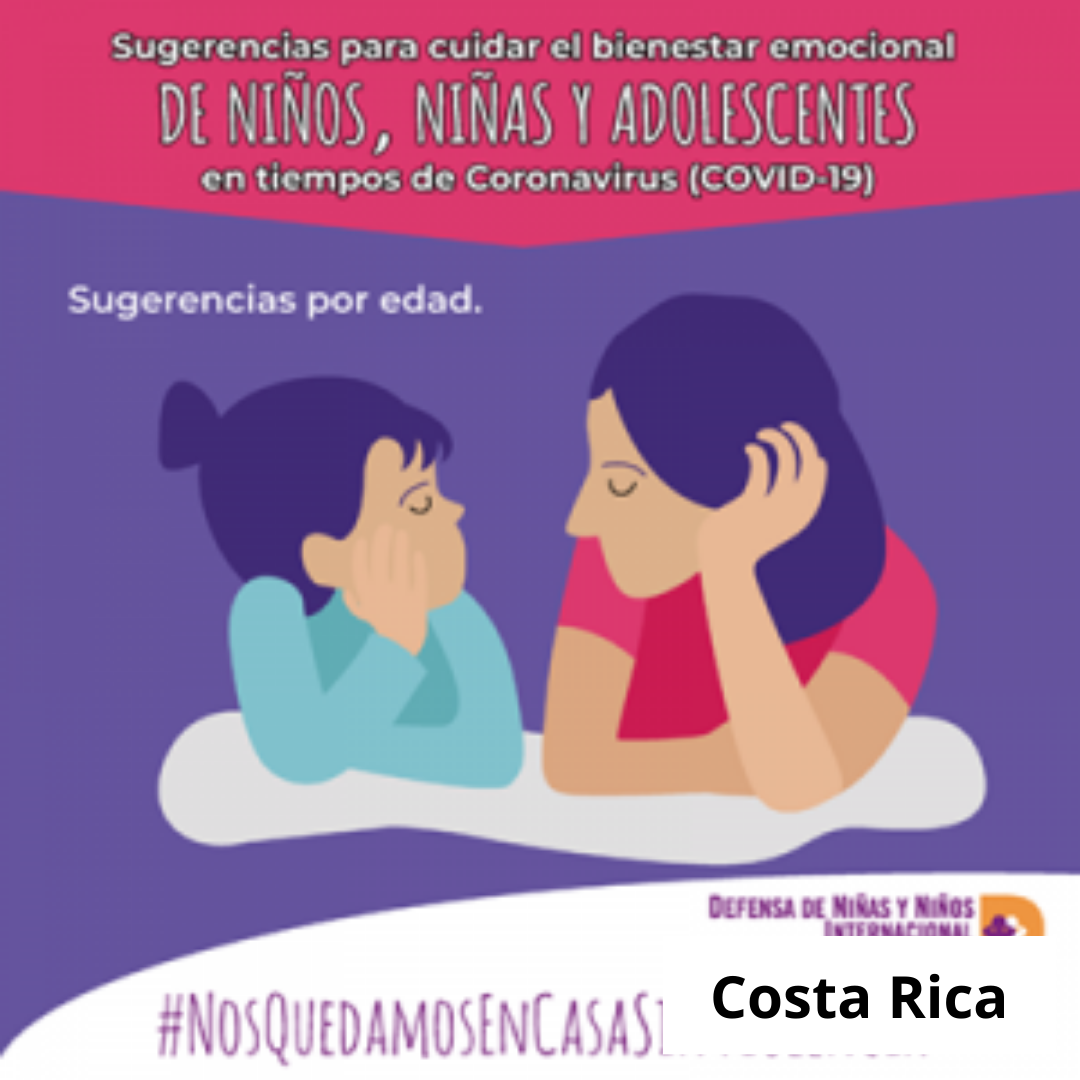 Defensa de Niñas y Niños Internacional-Costa Rica (DNI) expects potential increase in child labour and its worst forms. DNI is also working on a joint campaign with a local group to understand and respond to the impact of COVID on education, as schools are closed and all children do not have access to computers, phones, internet. As the most affected are the primary school children, DNI is working on a campaign to disseminate messages to the primary school children through radio, TV to raise their awareness on the issue. DNI is addressing 5 challenges identified as priorities in the crisis generated by COVID-19,i.e poverty and social exclusion, food security, prevention and attention to violence, education and social protection and alliances. Several campaigns related to the attention to violence, prevention of sexual abuse, tips on how to talk about COVID-19 to children and taking care of emotional wellbeing as well as different resources for learning have been created and shared on social media. A helpline is also made available for children. DNI has enabled a service platform, where support and information is provided to SMEs and families to apply to state and municipal resources and aids. Additionally, the delivery of food and hygiene kits is being organised as an emergency response. A proposal has also been developed to carry out a diagnosis to meet and approach children and understand reality from their voices, which will be implemented in the coming days.
Defensa de Niñas y Niños Internacional-Costa Rica (DNI) expects potential increase in child labour and its worst forms. DNI is also working on a joint campaign with a local group to understand and respond to the impact of COVID on education, as schools are closed and all children do not have access to computers, phones, internet. As the most affected are the primary school children, DNI is working on a campaign to disseminate messages to the primary school children through radio, TV to raise their awareness on the issue. DNI is addressing 5 challenges identified as priorities in the crisis generated by COVID-19,i.e poverty and social exclusion, food security, prevention and attention to violence, education and social protection and alliances. Several campaigns related to the attention to violence, prevention of sexual abuse, tips on how to talk about COVID-19 to children and taking care of emotional wellbeing as well as different resources for learning have been created and shared on social media. A helpline is also made available for children. DNI has enabled a service platform, where support and information is provided to SMEs and families to apply to state and municipal resources and aids. Additionally, the delivery of food and hygiene kits is being organised as an emergency response. A proposal has also been developed to carry out a diagnosis to meet and approach children and understand reality from their voices, which will be implemented in the coming days.
EL SALVADOR
Red de Organizaciones de Infancia y Adolescencia (RIA) is working to provide child-friendly information to children to counter the panic being created by fake news around the COVID-19 crisis in the country. Emergency kits have been given to communities in need by the RIA network. They have also held press conferences with CSOs demanding that National Protection Systems work effectively for the care of all children, especially those most at risk such as migrants and those who are confined in shelters. A consultation with children was also carried out at the regional level through national networks of children’s organisations in 10 countries in Latin America where RIA participated. Children actively participated at the Consultation sharing how the crisis is affecting them and also put forward their requests from authorities to address their concerns.
GHANA
General Agricultural Workers’s Union (GAWU) currently working on fundraising and humanitarian activities for serving the needy in the country providing them with food kits and protective kits, GAWU has also created awareness raising posters on the prevention and treatment of COVID-19. It is also further engaging with workers in the light of COVID-19 crisis.
GUATEMALA
Centro Ecuménico de Integración Pastoral (CEIPA) is working on prevention of COVID-19 by disseminating information with the communities they work with. Hygiene kits have been delivered to rural families by CEIPA. They are also working on access to education, trying to provide internet connection for accessing virtual classes, besides the government’s initiative to hold classes via radio and press. Food kits have also been supplied but the numbers are not enough. Thus CEIPA is working together with the Ministry of Agriculture to promote the creation of community and family gardens, as well as the exchange and provision of seeds to plant different products and tackle the shortage of food .
HONDURAS
La Red de Instituciones por los Derechos de la Niñez (COIPRODEN) carried out various activities focused on the protection of children in situations of higher vulnerability, such as migrant children, and children living on the streets. Advocacy and awareness campaigns have been carried out by COIPRODEN demanding protection of children along with continuing the campaign against child labour.
INDIA
Kailash Satyarthi Children’s Foundation (KSCF) has been monitoring the severity of the situation in rural and urban areas of India, where a shortage of food, essential items and personal protective gears has been reported. KSCF till now has linked 3000 families with government schemes for ration supply and has provided more than 8000 cooked meals, 5000 grocery kits and 2500 protective masks to daily wage earners, migrant labourers as well as children of underprivileged families who have lost all income sources. To ensure children do not miss out on education during the lockdown, KSCF is disseminating learning worksheets amongst 600 children of urban slums and has set up a Book Bank for children to pick up reading during the quarantine.
Bachpan Bachao Andolan (BBA) supported over 65,000 people in 15 states with dry ration for 20 days; 25,000 individuals were provided with cooked meals with efforts of partners in Delhi, Maharashtra and Punjab and 3,600 children living in Child Care Institutions across country have been provided health care kits. BBA also supported 50 migrant labourers and daily wage earners every day through a social kitchen setup in Delhi, taking all precautionary and hygiene measures. Two buildings in Delhi were also made available for use as quarantine / isolation centers to the Government. BBA tied-up with Indian Railways for putting up posters at stations and in trains for deterrence and providing help line details to combat trafficking. BBA also shared COVID-19 do’s and don’ts with around 1,500 child care institutions across the country to ensure safety of children living there.
IVORY COAST
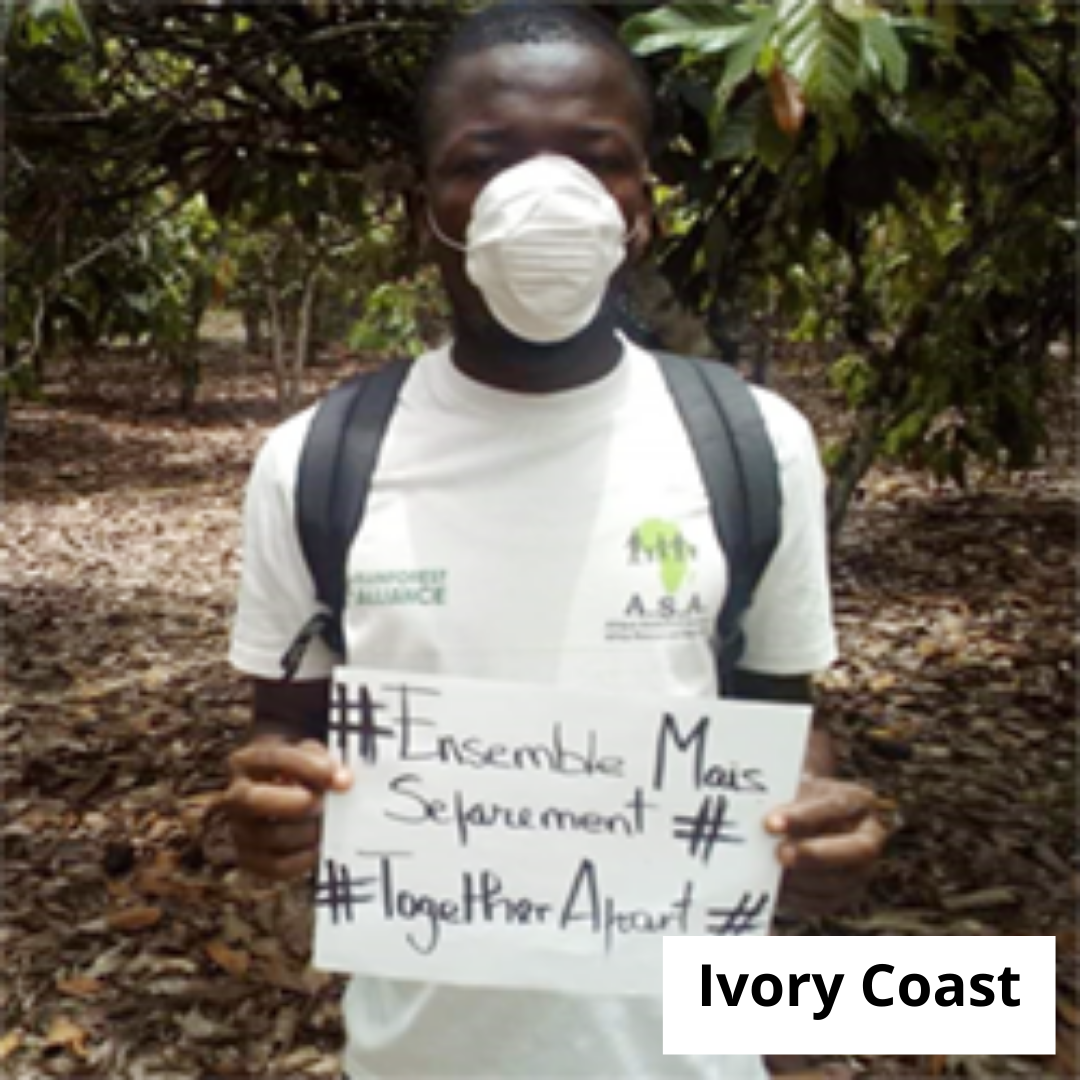 Afrique Secours Assistance (ASA) has been working to sensitise communities on the ways to prevent and protect themselves from the COVID-19 virus through radio transmission. ASA has been working in the cocoa-growing communities of Soubre for a long time, however after the outbreak of the virus, communities have been resistant in letting the social workers enter the communities, fearing contamination of people coming from the town. ASA is however working to ensure the communities have access to protective gears and hand washing kits.
Afrique Secours Assistance (ASA) has been working to sensitise communities on the ways to prevent and protect themselves from the COVID-19 virus through radio transmission. ASA has been working in the cocoa-growing communities of Soubre for a long time, however after the outbreak of the virus, communities have been resistant in letting the social workers enter the communities, fearing contamination of people coming from the town. ASA is however working to ensure the communities have access to protective gears and hand washing kits.
KENYA
Kenya Plantation and Agricultural Workers Union (KPAWU) identified vulnerable and hungry street children in Nakuru county in Kenya and served 600 street children with food and essential supplies.
MALAWI
People Serving Girls at Risk is providing frontline services to girls and women in need in their response to COVID-19. They are also undertaking awareness-raising on the disease, providing psychosocial counselling, and supporting vulnerable groups of people with food materials and other needs. Some of these materials were donated by the private sector, while others were contributed by staff and volunteers.
NEPAL
Swatantrata Abhiyan (SAN) along with other network of organisations working for child rights has submitted a 14 point appeal letter to the Government of Nepal through the Ministry of Planning as well as the Ministry of Children, Women and Senior Citizen on prioritising the needs of children while implementing Covid19 responses in the country. SAN is also co-leading the Advocacy Working Group of Alliance for Child Protection in Humanitarian Settings and under the same, SAN has been sharing information and technical notes on COVID-19 related issues, developed globally to the network members. SAN is currently also working on a joint appeal towards Ministry of Labour Employment and Social Security to address the needs of child labour and their families. The Domestic Workers Forum (DWF) formed under the guidance of SAN by the domestic workers of Nepal, also identified vulnerable domestic workers in Kathmandu who needed support for accessing basic food supplies and linked them with the Government for the provision of the same.
NICARAGUA
Coordinadora De La Niñez (CODENI) has been involved in collating views and perceptions from communities, including children,from the rural areas. This survey prioritises the stories told by their own voices. A guide to tackle COVID-19 with children is being developed as well.
PAKISTAN
Grassroot Organisation for Human Development (GODH) as part of Government of Punjab’s Non-Profit Organisations Committee has been participating in the meeting chaired by the Health Minister and the Chief Minister, in their efforts towards protecting vulnerable people and children of Punjab from COVID-19 virus. To create awareness GODH has organised radio shows and awareness-raising activities with children to demonstrate how they can protect themselves. GODH has also been engaged in the distribution of food supplies and health kits in the poorer communities especially gypsy communities and amongst daily wage earners who do not have National Identity Cards. Those who do possess National Identity Cards, GODH is linking them with government schemes and programmes such as Ehsaas Programme and other social safety net schemes.
PANAMA
Instituto para el desarrollo de la mujer y la infancia (IDEMI) has strengthened its communication system with the communities and is disseminating important information on COVID-19 to them, especially on the importance of prevention and confinement. IDEMI is advocating with the National Council for Women for the National Office for Women to establish a plan to support women in the pandemic. IDEMI is also in regular touch with adolescents groups (supported by IDEMI and other communities) to oversee the provision of food kits, vouchers and water provided by local authorities. IDEMI is also working closely with former adolescent leaders of IDEMI groups who are now serving in the media, police or the legal system to ensure support for the needy children and communities. As a member of the network Allies for Children and Adolescents, IDEMI is planning a conference to demand virtual education for public schools and colleges, and take into account the best interests of children in government programs and services due to the pandemic.
PARAGUAY
Fundación Dequení and other CSOs in Paraguay are actively advocating and supporting the government in the areas of protection, health and education of children. Dequení and its allies are therefore advocating for the reactivation of the protection system for children at the local level and supporting the government on food security measures for the most vulnerable children, families and communities. It is also producing communication materials for mass distribution in public media and community radio network for raising awareness among families and children with emphasis on socio-emotional wellbeing in this pandemic. It is further engaging with the Ministry of Children and Adolescents and local governments as well as working together with the Front for Children and the Group for Children in Parliament. Additionally, Dequini is delivering food kits, community meals, hygiene kits as well as organising online talks on education, health and protection.
PERU
Centro de Estudios Sociales y Publicaciones- Peru (CESIP) has been concerned about the informal workers which constitute 70% of the workforce who are in a vulnerable situation due to quarantine measures in Peru. Due to lack of access to digital education by most children, CESIP fears increase in child labour and is working towards understanding the situation and consequences. CESIP proposed the need for a special meeting to analyse the situation of child labour in the country, both at present and in the post-pandemic scenario. CESIP is working together with the National Initiative Group for the Rights of the Child (GIN) for political advocacy on the strengthening of child and adolescent protection systems in the pandemic.
SRI LANKA
 Centre for Children’s Happiness (CCH) Sri Lanka has been engaged in relief work in the Jaffna region providing essential items to 340 families and their children in 8 divisions. To deal with violence and abuse at home against children and girls, CCH Sri Lanka formed an action group of psychiatrists, counsellors, psychosocial practitioners and social workers. CCH Sri Lanka is also working with the Department of Education and Child Protection Unit to reach out to more and more people and take care of their needs and have identified 800 more such families that need immediate support.
Centre for Children’s Happiness (CCH) Sri Lanka has been engaged in relief work in the Jaffna region providing essential items to 340 families and their children in 8 divisions. To deal with violence and abuse at home against children and girls, CCH Sri Lanka formed an action group of psychiatrists, counsellors, psychosocial practitioners and social workers. CCH Sri Lanka is also working with the Department of Education and Child Protection Unit to reach out to more and more people and take care of their needs and have identified 800 more such families that need immediate support.
TOGO
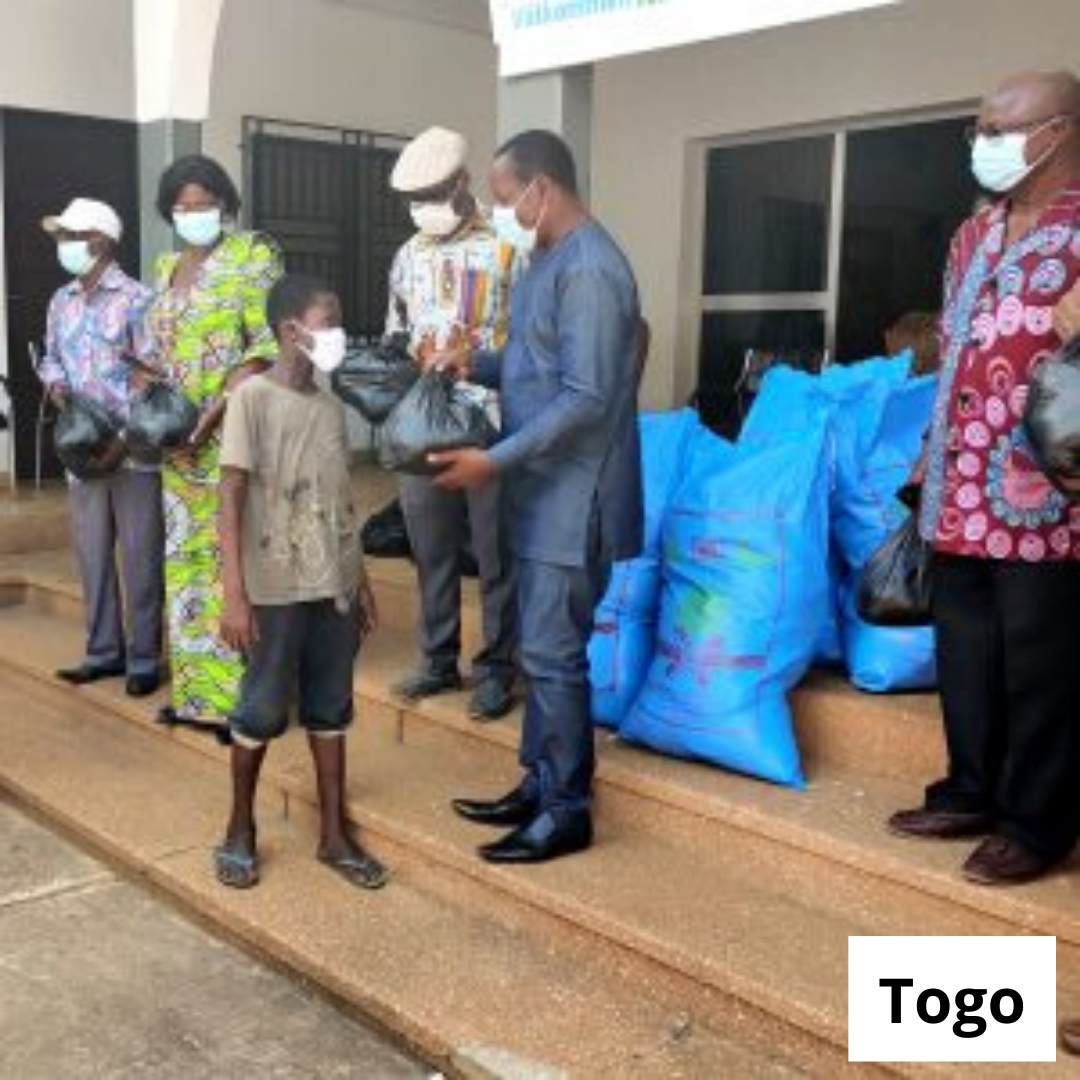 WAO Afrique along with members of the Parliamentarians Sans Frontières (PSF Togo- country chapter of PWB) is addressing the needs of street children who they feel are at most risk currently due to the ongoing pandemic. They have provided 100 children with food kits and protective safety equipment and are also conducting awareness raising amongst this extremely vulnerable community to explain to them the facts of the virus, the current situation and its potential impact on their lives.
WAO Afrique along with members of the Parliamentarians Sans Frontières (PSF Togo- country chapter of PWB) is addressing the needs of street children who they feel are at most risk currently due to the ongoing pandemic. They have provided 100 children with food kits and protective safety equipment and are also conducting awareness raising amongst this extremely vulnerable community to explain to them the facts of the virus, the current situation and its potential impact on their lives.
Global March members such as the above and many more across the world are doing their best to make a critical difference in the lives of thousands of at-risk children and their families. But the fight against COVID -19 is not over yet and the need for protecting children amidst this crisis is pertinent now more than ever.
Henceforth, Global March Secretariat is preparing for a coordinated response with its members across the globe and is trying to reach out to the hardest to reach.
We, however, cannot do this alone. Join us today to make a positive impact on those made vulnerable by this crisis.




